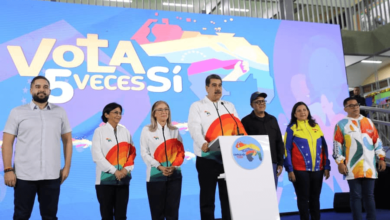“They’ve informed me the baseball landed in the center of the White House. Right in the center, a gift for Bush,” Venezuelan President Hugo Chávez joked to thousands of supporters outside the presidential residence in Caracas following the failed right-wing recall referendum of August 15, 2004.
Chávez had promised a “home run” in the election. The workers and poor people of Venezuela hit one, defeating the recall by a margin of 58 percent to 42 percent.
An unprecedented 8,502,114 people voted in the election. It was one more battleground for the Venezuelan masses to demonstrate their support for the “Bolivarian Revolution,” named after the great anti-colonial fighter Simon Bolivar. It was a crushing defeat not only for the capitalist oligarchy, but also for Washington’s latest attempt to overthrow the Chávez government.
Not surprisingly, the opposition, led by powerful business owners and nurtured by the U.S. government, refused to admit defeat and was soon claiming massive fraud.
But even bourgeois observers like former presidents Jimmy Carter of the U.S. and Carlos Gaviria of Colombia had to pronounce the process “fair,” weakening the claims of fraud.
It took the U.S. State Department 36 hours to recognize the referendum outcome, with a statement by deputy spokesperson Adam Ereli at 1 p.m. on August 17. Ereli acknowledged the results but called for an audit, saying, “There are issues related to irregularities that are charged.”
Ereli also left the door open for future U.S. accusations of a Venezuelan threat to U.S. “security”:
“As we move forward in our relationship with Venezuela, we think it’s important to remember these fundamentals … that democracy and human rights [sic] are important, that mutually beneficial economic and energy policies are [sic] important to both of us, and that we have a shared stake in hemispheric security, and cooperation in that area is necessary.”
The State Department’s bubble was soon burst. Vice-President José Vicente Rangel gave a surprising announcement at a press conference on Aug. 17. Pro-Chávez forces would support a re-count.
He said, “This government is more powerful than ever and I say it without arrogance. It is totally legitimized again. It has the most absolute international backing.”
DANGER FROM IMPERIALISM FAR FROM OVER
As Chávez and every Venezuelan revolutionary know, they are confronting more than just Venezuelan corporate bosses and a reactionary middle class. U.S. imperialism itself is the most formidable “opposition.” Washington never respected an election or government it didn’t control. Chávez’s support from the people has been recorded in eight different referendums since first being elected president in 1998. In each of these challenges, he has received around 60 percent of the vote.
The U.S. thought a recall vote would be a cakewalk to rout Chávez and overthrow the revolutionary political and economic process. It miscalculated.
Washington and its agents, like Carter, were undoubtedly hoping for an outcome like the Nicaraguan 1990 elections, when the progressive Sandinista government lost an election fully infiltrated and financed by the U.S. National Endowment for Democracy. Carter oversaw that election, and later boasted that he had helped “remove the Sandinistas from power.”
The NED pumped millions of dollars into the Caracas opposition, convinced that its “formula” of economic sabotage, assassination plots and generous funding of the anti-Chávez forces would bring victory.
PEOPLE FINANCE THE “NO” VOTE
Popular in all aspects, the “No” to the recall campaign was financed by donations. A people’s raffle was launched in July for funds to fight the recall. “This is not just any raffle,” said raffle coordinator Diosdado Cabello. “It is a reminder of collaborating with the revolutionary process and with President Chávez.”
Eight million tickets were sold for 1,000 Bolivares, about 50 cents each in U.S. dollars.
Vigilance is the watchword. U.S. imperialism is not through with Venezuela. But there is no going back for the workers and oppressed in Bolivar’s homeland.
All eyes are on the Bolivarian revolutionary process. It is bound to inspire millions more in Latin America and the Caribbean to wage a determined struggle and win.
18 3 minutes read





